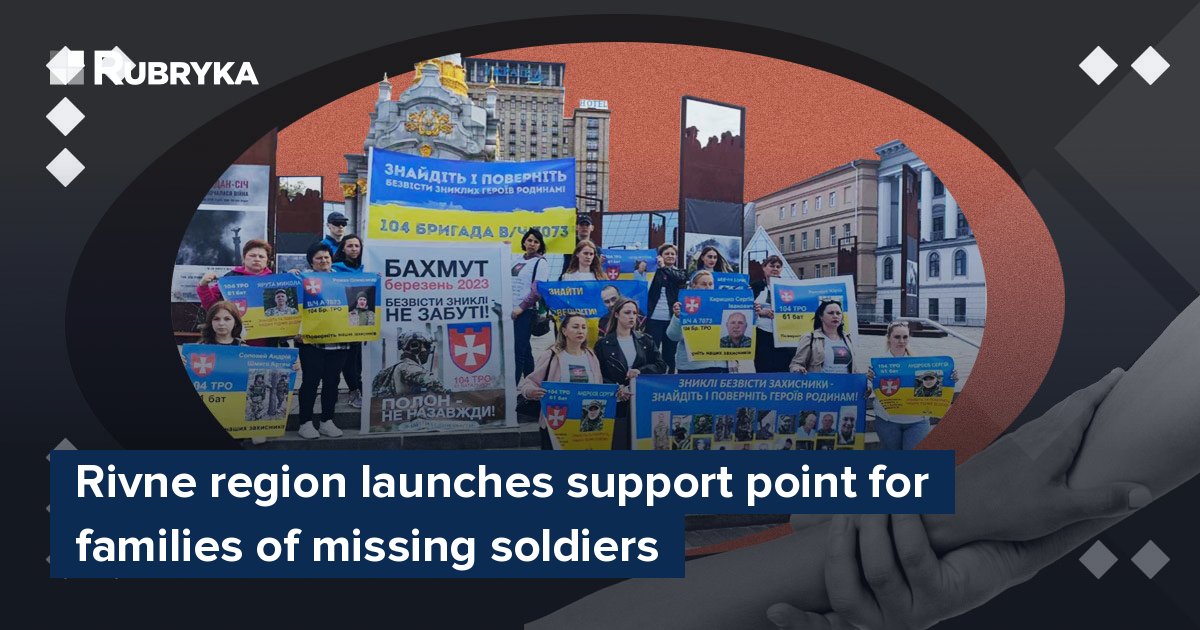
What is the problem?
Since May 2023, the Unified Register of Missing Persons has been operating in Ukraine, which contains information on thousands of missing military personnel. Missing service members are those captured or wounded but unrecognizable due to loss of consciousness or memory. Some of them might be the dead, whose bodies could not be evacuated from the battlefield.
If there is reason to believe that a service member is missing or captured, the Ukrainian army initiates a search and adds data to the register. Often, relatives of a service member who has received the status of missing do not know what to do, being left alone with their pain and uncertainty.
What is the solution?
In the village of Volodymyrets, a consultation point for the families of the missing persons has become operational in the Rivne region. It explains what Ukrainian families should do when receiving a notification and organizes mutual support groups.
The project "Organization of a consultation point for families of missing persons in the village of Volodymyrets" was made possible thanks to the support of the International Commission on Missing Persons (ICMP) and financial assistance from the Norwegian Agency for the Development of Cooperation for the ICMP program in Ukraine (NORAD).
How does it work?
"Our main goal is to help the families of missing soldiers unite in a community"

Peaceful rally in support of missing persons and prisoners on the Independence Square, Kyiv. Photo from the archive of Lidia Lukovets
As the project manager, Lidiia Lukovets, said, the idea of creating an advisory point for families of missing persons in special circumstances in Volodymyrka first appeared in February when community residents were offered to participate in the project of small grants from the ICMP. Since then, together with Roman Shvets, the head of the NGO Center for Psychosocial Support, Lukovets has started to create a consultation point.
The project is aimed at providing representation, support, consultation, and advice to the families of missing persons living in Volodymyrka and neighboring communities. At the consultation point, the team helps with writing an appeal or statement, prepares a package of documents, refers you to a specialist, explains the practice of solving similar issues.
"We believe that the project will help unite the families of the missing in a community where they can share experiences and support each other," the project's manager shared with Rubryka.
Lukovets, mother of three children and wife of a soldier, learned the algorithm of actions in the procedure of searching for a missing soldier from her own experience. Her husband, Pavlo Lukovets, began service in 2015 during the war in Ukraine's east. In August 2021, Lukovets resigned, and six months later, he received a call from the military commissariat to return to his unit.

Lidiia Lukovets with her husband Pavlo. Pre-war photo from the heroine's archive
Lukovets was sure there would be a war because already in August 2021, near Volnovakha, in the Donetsk region, they were shelled with mines every day.
At the beginning of the full-scale invasion, Lukovets served in the 104th Separate Territorial Defense Brigade of the 61st Battalion. In March 2023, they were sent to defend Bakhmut. According to the wife, her heart had been in her mouth since then.
On March 14, Lidiia Lukovets found out that a landmine had landed in the house where her husband was supposed to be, and what happened to him is unknown.
She wrote a statement to the police and handed over DNA, but no one could explain to her what to do next.

Lidiia Lukovets holds a poster with a photo of her missing husband. Photo from the heroine's archive
Lukovets received help from the Rivne Coordination Headquarters. She understood that the families of the missing defenders needed to unite and fight for their loved ones together, so she decided to create a group where such families could communicate.
In one of Lukovets' brigades, there were 25 missing persons in March alone. Three were returned from captivity, but there was practically no information about other service members who could have been captured by Wagner group soldiers stationed in Bakhmut at that time.
"With the families of the missing, we have been to all state structures, peaceful rallies, communicated with families from other brigades, and exchanged experience and information. We are always together, and we solve all the issues of our team together. We have been searching for 15 months already, and during this time, we have probably become almost relatives," Lukovets shares.
"Together, we can cry and laugh"

Wives of missing service members at a peaceful rally. Photo from the archive of Lidiia Lukovets
A service member is considered missing if they have not returned after completing a combat mission and has not been officially confirmed as a prisoner of war or their relatives have not received his body. As of October 2023, about 15,000 servicemen are recorded in the Unified Register of Missing Persons.
When Lukovets' husband disappeared, she felt the need to create an office in rural and urban communities where people from such families would be given advice and help and be directed to the right specialist. At that time, many people turned to her for help, and she always shared information about the search and supported them in difficult moments because she knew from her own experience that living in the unknown is very difficult.
"Such families always switch from a feeling of hope that their loved ones might still be alive to a feeling of indescribable pain that they are no longer there. This is a constant emotional swing," says Lukovets.

In the Coordination Headquarters in Kyiv. Photo from the archive of Lidiia Lukovets
According to Lukovets, the words "hang on" and "everything will be fine" hurt such families the most, as do questions about whether the family received payments from the state. When the person first goes missing, the relatives often hear questions about whether they have already found their loved ones. Lukovets says it is not an easy task. This is a daily struggle for relatives.
"Support such families, listen to their pain. For many, the most important thing is to be heard. All this gives us strength, and we have to be strong so that when our relatives return, we can be a support team for them," Lukovets urges.
Does it really work?

Relatives of missing soldiers at a meeting at the Coordination Headquarters. Photo from the archive of Lidiia Lukovets
As the manager of the consulting point notes, it is still too early to measure the results of its work. However, it is important that people like Lukovets get the necessary support, advice, and help.
One of the tasks of the newly created point is organizing trips to state structures to search for missing persons and return prisoners. Recently, a trip was organized to the Coordination Headquarters in Kyiv.
"It was difficult for us because every family hopes to get at least some news about their relative. Some people in our group have been looking for their family members since 2022. They find solace and understanding in such communities and associations of families of the missing," Lukovets shares with Rubryka.
Even more useful solutions!
The process goes as follows:
The relatives prepare and submit a written statement accompanied by evidence to the law enforcement authorities—the police department of the district in which the soldier disappeared or the applicant's place of residence.
The more information is provided, the higher the chances of finding the missing person — profile data, date, month, and year of birth, place of service (brigade, military unit, company, platoon), last known place of residence, contacts of relatives, date and place of disappearance, special signs (tattoos, scars, piercings, etc.), things they could have with them (mobile phone, documents, jewelry, etc.).
If necessary, upon submission of a statement about the specified fact, a biological sample is submitted to derive a DNA profile for further comparison. Samples are taken from the missing person's biological parents or children.
Next, people contact the military commissariat and military unit and receive a report on a serviceman's disappearance. Then, a written statement to the specialized prosecutor's office in the military and defense sphere of the region in which the soldier disappeared is prepared and submitted.
There are also some other institutions that should be addressed to:
- The Human Rights Commissioner of the Verkhovna Rada of Ukraine (ombudsman).
- The Commissioner for the Issues of Persons Missing in Special Circumstances
- The Joint Center for the Search and Release of Prisoners under the Security Service of Ukraine
- The National Information Bureau for the Search of Prisoners of War and Civilian Hostages
- The Ukrainian National Information Agency Ukrinform on the website or via e-mail.
It is also worth submitting relevant information about missing persons on the following websites:
- https://dokaz.gov.ua
- Resource created by the Office of the Prosecutor General for the proper documentation of war crimes and crimes against humanity committed by the Russian army in Ukraine
- https://humanrights.gov.ua
- ICRC in Ukraine





